Before getting into this new podcast, have you checked out the recent newsletter editions of Ground Truths?
—how are gut microbiome drives sugar cravings
—the influence of sleep on brain waste clearance and aging
—the new findings of microplastics in the brain
—the surprise finding about doctors and A.I.
In this podcast with Dr. Emily Silverman, an internist and founder of The Nocturnists, an award winning podcast and live show, we discuss what inspired her in medicine, what led to her disillusionment, the essentiality of storytelling, of recognizing uncertainty, the limits of A.I., and promoting humanity in medicine. The audio is available on iTunes and Spotify. The full video is linked here, at the top, and also can be found on YouTube.
“Storytelling is medicine's currency. Storytelling is not just an act of self-healing; it may actually create better physicians.”—Emily Silverman
Transcript with links to audio and relevant publications, websites
Eric Topol (00:07):
Well, hello. This is Eric Topol with Ground Truths, and with me, I am delighted to welcome Dr. Emily Silverman, who is Assistant Volunteer Professor of Medicine at UCSF, an old training grounds for me. And we're going to talk about some of the experience she's had there and she is the Founder of the remarkably recognized podcast, The Nocturnists. It's more than a podcast folks. We'll talk about that too. So Emily, welcome.
Emily Silverman (00:40):
Thank you for having me.
Inspiration by Kate McKinnon
Eric Topol (00:42):
Yeah. Well, I thought I would go back to perhaps when we first synapsed, and it goes back to a piece you wrote in JAMA about going to the Saturday Night Live (SNL) with Kate McKinnon. And it was one of my favorite columns, of course, it brought us together kind of simpatico because you were telling a story that was very personal, and a surprise factor added to it. We'll link to it. But it said, ‘Sometime in 2016, I fell in love with SNL comedian Kate McKinnon.’ You wrote, ‘It was something about her slow-mo swagger; her unilateral dimple, flickering in and out of existence; the way she drinks up her characters and sweats them from her pores.’ I mean, you're an incredible writer, no less podcast interviewer, organizer, doctor. And you talked about my sterile clinical life, which was kind of maybe a warning of things to come and about the fact that there's two very different career paths, comedy and medicine. One could argue they are in essence the same. So maybe you could tell us about that experience and about Kate McKinnon who, I mean, she's amazing.
Emily Silverman (02:09):
You're making me blush. Thank you for the kind words about the piece and about the writing, and I'm happy to give you a bit of background on that piece and where it came from. So I was in my internal medicine residency at UCSF and about halfway through residency really found myself hitting a wall. And that is actually what gave birth to The Nocturnists, which is the medical storytelling program that I run. But I think another symptom of my hitting that wall, so to speak, and we can talk more about what exactly that is and what that means, was me really looking outside of medicine and also outside of my typical day-to-day routine to try to find things that were a part of me that I had lost or I had lost touch with those aspects of myself. And one aspect of myself that I felt like I had lost touch to was my humorous side, my sense of humor, my silly side even you could say.
Emily Silverman (03:17):
And throughout my life I have this pattern where when I'm trying to get back in touch with a side of myself, I usually find somebody who represents that and sort of study it, I guess you could say. So in this case, for whatever reason that landed on Kate McKinnon, I just loved the surrealism of her comedy. I loved how absurd she is and loved her personality and so many things. Everything that you just read and really found her and her comedy as an escape, as a way to escape the seriousness of what I was doing on a day-to-day basis in the hospital and reconnect with those humorous sides of myself. So that's the understory. And then the story of the article is, I happened to be traveling to New York for a different reason and found myself standing in line outside of 30 Rock, hoping to get into Saturday Night Live. And there was basically a zero chance that we were going to get in. And part of the reason why is the musical guest that week was a K-pop band called BTS, which is one of the most famous bands in the world. And there were BTS fans like camped out in three circles around 30 Rock. So that week in particular, it was especially difficult to get in. There was just too many people in line. And we were at the very end of the line.
Eric Topol (04:43):
And it was in the pouring rain, too.
Emily Silverman (04:45):
And it was pouring rain. And my husband, God bless him, was there with me and he was like, what are we doing? And I was like, I don't know. I just have a feeling that we should stay in line, just go with it. So we did stay in line and then in the morning we got a number, and the way it works is you get your number and then that evening you show up with your number and our number was some crazy number that we weren't going to get in. But then that evening when we went back with our number to wait in line again to get in, what ended up happening is a young woman in the NBC gift shop, she passed out in the middle of the gift shop and I was right there. And so, I went over to her and was asking her questions and trying to help her out.
Emily Silverman (05:27):
And fortunately, she was fine. I think she just was dehydrated or something, and the security guards were so appreciative. And the next thing I knew, they were sweeping me backstage and up a staircase and in an elevator and they said, thank you so much for your service, welcome to Saturday Night Live. So it became this interesting moment where the very thing that I had been escaping from like medicine and serving and helping people ended up being the thing that gave me access, back to that side of myself, the humorous side. So it was just felt kind of cosmic, one of those moments, like those butterfly wing flapping moments that I decided to write about it and JAMA was kindly willing to publish it.
Eric Topol (06:15):
Well, it drew me to you and recognize you as quite an extraordinary talent. I don't know if you get recognized enough for the writing because it's quite extraordinary, as we'll talk about in some of your other pieces in the New York Times and in other JAMA journals and on and on. But one thing I just would note is that I resort to comedy a lot to deal with hard times, like the dark times we're in right now, so instead of watching the news, I watch Jimmy Kimmel's monologue or Colbert's monologue or the Comedy Show, anything to relieve some of the darkness that we're dealing with right at the moment. And we're going to get back to comedy because now I want to go back, that was in 2019 when you wrote that, but it was in 2016 when you formed The Nocturnists. Now, before you get to that critical path in your career of this new podcast and how it blossomed, how it grew is just beyond belief. But maybe you could tell us about your residency, what was going on while you were a medical resident at UCSF, because I can identify with that. Well, like any medical residency, it's pretty grueling experience and what that was like for you.
Medical Residency
Emily Silverman (07:45):
There were so many wonderful positive aspects of residency and there were so many challenges and difficult aspects of residency. It's all mixed up into this sticky, complicated web of what residency was. On the positive side, some of the most amazing clinicians I've ever met are at UCSF and whether that was seasoned attendings or chief residents who they just seemed to have so many skills, the clinical, the research, the teaching, just amazing, amazing high caliber people to learn from. And of course, the patient population. And at UCSF, we rotate at three different hospitals, the UCSF hospital, the SF General Hospital, which is the public county hospital and the VA hospital. So having the opportunity to see these different patient populations was just such a rich clinical and storytelling opportunity. So there was a lot there that was good, but I really struggled with a few things.
Emily Silverman (08:48):
So one was the fact that I spent so much of my sitting in front of a computer, and that was not something that I expected when I went into medicine when I was young. And I started to learn more about that and how that happened and when that changed. And then it wasn't just the computer, it was the computer and other types of paperwork or bureaucratic hurdles or administrative creep and just all the different ways that the day-to-day work of physicians was being overtaken by nonclinical work. And that doesn't just mean thinking about our patients, but that also means going to the bedside, sitting with our patients, getting to know them, getting to know their families. And so, I started to think a lot about clinical medicine and what it really means to practice and how that's different from how it was 10, 20, 40 years ago.
Emily Silverman (09:43):
And then the other part of it that I was really struggling with was aspects of medical culture. The fact that we were working 80 hour weeks, I was working 28 hour shifts every fourth night, every other month. And the toll that took on my body, and I developed some health issues as a result of that and just felt in a way, here I am a doctor in the business of protecting and preserving health and my own health is kind of being run into the ground. And that didn't make sense to me. And so, I started asking questions about that. So there was a lot there. And at first I thought, maybe this is a me thing or maybe this is a California thing. And eventually I realized this was a national thing and I started to notice headlines, op-eds, articles, even pre-Covid about the epidemic of clinician burnout in this country.
Emily Silverman (10:40):
And there are so many different facets to that. There's the moral injury aspect of it, there's the working conditions and understaffing aspect of it. I learned about how physicians were starting to think about unionizing, which was something that had not really been in the physician, I think consciousness 20, 40 years ago. So just started learning a lot about how medicine had evolved and was continuing to evolve and felt myself wanting to create a space where people could come together and tell stories about what that was like and what their experience was. And that was the birth of The Nocturnists. But I guess that wasn't really your question. Your question was about residency.
Birth of The Nocturnists
Eric Topol (11:20):
That's a good answer actually. It kind of gives the background, lays the foundation of how you took a fork in the road here, which we're going to get into now. We're going to link to The Nocturnists website of course, but you have an intro there about, ‘shatter the myth of the “physician God” reveal the truth: that healthcare workers are human, just like everyone else, and that our humanity is our strength, not our weakness.’ And that's a very deep and important point that you make to get people interested in The Nocturnists. But now you finished your residency, you're now on the faculty, assistant professor at UCSF, and then you have this gathering that you hadn't already named it the Nocturnists yet had you?
Emily Silverman (12:15):
I named it in residency.
Eric Topol (12:17):
Oh, okay in residency. So this was even before you had finished, you started the podcast before you finished?
Emily Silverman (12:25):
Correct. Before we were a podcast, we were a live show. So the very first live show was in 2016, so I consider that the birth year of the program. And then I graduated residency in 2017, so I started it about halfway through residency.
Eric Topol (12:39):
Got it. So tell us about that first live show. I mean, that's pretty amazing. Yeah.
Emily Silverman (12:46):
Yeah. I went to a live taping of The Moth in San Francisco, which some of your listeners may know. The Moth is a live storytelling show in the US, it's often on the radio on NPR. You may have heard it. It's a very ancient way of telling stories. It's more like monologues, people standing up on stage and just spontaneously telling a story the way you would around a campfire or something like that. It's not hyper scripted or anything like that. So I came out of that event feeling really inspired, and I had always loved live performance and live theater. I grew up going to the theater and ended up deciding that I would try that with my community, with the clinicians in my community. So the very first show that we did was in 2016, it was about 40 people in this living room of this Victorian mansion in San Francisco.
Emily Silverman (13:42):
It was a co-op where different people lived. In the living space, they occasionally rented out for meetings and presentations and gatherings, and it was like $90. So I rented that out and people came and residents, physician residents told stories, but a couple of faculty came and told stories as well. And I think that was a really nice way to set the stage that this wasn't just a med student thing or a resident thing, this was for everybody. And there was definitely an electricity in the air at the show. I think a lot of people were experiencing the same thing I was experiencing, which was having questions about the medical system, having questions about medical culture, trying to figure out how they fit into all of that, and in my case, missing my creative side, missing my humorous side. And so, I think that's the reason people came and showed up was that it wasn't just a night out of entertainment and coming was really more out of a hunger to reconnect with some aspect of ourselves that maybe gets lost as we go through our training. So that was the first show, and people kept asking, when are you going to do another one? When are you going to do another one? The rest is history. We have done many shows since then. So that was the beginning.
Eric Topol (14:58):
Well, you've been to many cities for live shows, you sold out hundreds and hundreds of seats, and it's a big thing now. I mean, it's been widely recognized by all sorts of awards, and the podcast and the shows. It's quite incredible. So a derivative of The Moth to medicine, is it always medical people telling stories? Does it also include patients and non-medical people?
Emily Silverman (15:28):
So we're nine years in, and for the first several years, this question came up a lot. What about the patient voice? What about the patient perspective? And the way that I would respond to that question was two ways. First, I would say the line between doctor and patient isn't as bright as you would think. Doctors are also patients. We also have bodies. We also have our own medical and psychiatric conditions and our own doctors and providers who take care of us. So we're all human, we're all patients. That said, I recognize that the doctor, the clinician has its own unique place in society and its own unique perspective. And that's really what I was trying to focus on. I think when you're making art or when you're making a community, people ask a lot about audience. And for me, for those first several years, I was thinking of The Nocturnists as a love letter by healthcare to healthcare. It was something that I was making for and with my community. And in recent months and years, I have been wondering about, okay, what would a new project look like that pulls in the patient voice a bit more? Because we did the clinician thing for several years, and I think there's been a lot of wonderful stories and material that's come out of that. But I'm always itching for the next thing. And it was actually an interview on the podcast I just did with this wonderful person, Susannah Fox.
Eric Topol (17:04):
Oh yeah, I know Susannah. Sure.
Emily Silverman (17:04):
Yeah. She was the chief technology officer at the Department of Health and Human Services from 2015 to 2017, I want to say. And she wrote a book called Rebel Health, which is all about patients who weren't getting what they needed from doctors and researchers and scientists. And so, they ended up building things on their own, whether it was building medical devices on their own, on the fringes or building disease registries and communities, online disease communities on their own. And it was a fabulous book and it was a fabulous interview. And ever since then I've been thinking about what might a project look like through The Nocturnists storytelling ethos that centers and focuses on the patient voice, but that's a new thought. For the first several years, it was much more focused on frontline clinicians as our audience.
Why is Storytelling in Medicine so Important?
Eric Topol (17:55):
And then I mean the storytelling people that come to the shows or listen to the podcast, many of them are not physicians, they're patients, all sorts of people that are not part of the initial focus of who's telling stories. Now, I want to get into storytelling. This is, as you point out in another JAMA piece that kind of was introducing The Nocturnists to the medical community. We’ll link to that, but a few classic lines, ‘Storytelling is medicine's currency. Storytelling is not just an act of self-healing; it may actually create better physicians.’ And then also toward the end of the piece, “Some people also believe that it is unprofessional for physicians to be emotionally vulnerable in front of colleagues. The greater risk, however, is for the healthcare professional to appear superhuman by pretending to not feel grief, suffer from moral distress, laugh at work, or need rest.” And finally, ‘storytelling may actually help to humanize the physician.’ So tell us about storytelling because obviously it's one of the most important, if not the most important form of communication between humans. You nailed it, how important it is in medicine, so how do you conceive it? What makes it storytelling for you?
Emily Silverman (19:25):
It's so surreal to hear you read those words because I haven't read them myself in several years, and I was like, oh, what piece is he talking about? But I remember now. Look, you on your program have had a lot of guests on to talk about the massive changes in medicine that have occurred, including the consolidation of it, the corporatization of it, the ways in which the individual community practice is becoming more and more endangered. And instead what's happening is practices are getting gobbled up and consolidated into these mega corporations and so on and so forth. And I just had on the podcast, the writer Dhruv Khullar, who wrote a piece in the New Yorker recently called the Gilded Age of Medicine is here. And he talks a lot about this and about how there are some benefits to this. For example, if you group practices together, you can have economies of scale and efficiencies that you can't when you have all these scattered individual self-owned practices.
Emily Silverman (20:26):
But I do think there are risks associated with the corporatization of healthcare. The more that healthcare starts to feel like a conveyor belt or a factory or fast food like the McDonald's of healthcare, MinuteClinic, 15 minutes in and out, the more that we risk losing the heart and soul of medicine and what it is; which is it's not as simple as bringing in your car and getting an oil change. I mean, sometimes it is. Sometimes you just need a strep swab and some antibiotics and call it a day. But I think medicine at its best is more grounded in relationships. And so, what is the modern era of medicine doing to those relationships? Those longitudinal relationships, those deeper relationships where you're not just intimately familiar with a patient's creatinine trend or their kidney biopsy results, but you know your patient and their family, and you know their life story a little bit.
Emily Silverman (21:26):
And you can understand how the context of their renal disease, for example, fits into the larger story of their life. I think that context is so important. And so, medicine in a way is, it is a science, but it's also an art. And in some ways it's actually kind of an applied science where you're taking science and applying it to the messy, chaotic truth of human beings and their families and their communities. So I think storytelling is a really important way to think of medicine. And then a step beyond that, not just with the doctor patient interaction, but just with the medical community and medical culture at large. I think helping to make the culture healthier and get people out of this clamped down place where they feel like they have to be a superhuman robot. Let's crack that open a little bit and remind ourselves that just like our patients are human beings, so are we. And so, if we can leverage that, and this is also part of the AI conversation that we're having is like, is AI ever going to fully substitute for a physician? Like, well, what does a physician have that AI doesn't? What does a human being have that a machine doesn’t? And I think these are really deep questions. And so, I think storytelling is definitely related to that. And so, there's just a lot of rich conversation there in those spaces, and I think storytelling is a great way into those conversations.
Eric Topol (22:57):
Yeah. We'll talk about AI too, because that's a fascinating future challenge to this. But while you're talking about it, it reminds me that I'm in clinic every week. My fellow and I have really worked on him to talk to the patients about their social history. They seem to omit that and often times to crack the case of what's really going on and what gets the patient excited or what their concerns are really indexed to is learning about what do they do and what makes them tick and all that sort of thing. So it goes every which way in medicine. And the one that you've really brought out is the one where clinicians are telling their stories to others. Now you've had hundreds and hundreds of these physician related stories. What are some of the ones that you think are most memorable? Either for vulnerability or comedy or something that grabbed you because you’ve seen so many, and heard so many now.
A Memorable Story
Emily Silverman (24:02):
It's true. There have been hundreds of physician stories that have come through the podcast and some non-physician. I mean, we are, because I'm a doctor, I find that the work tends to be more focused around doctors. But we have brought in nurses and other types of clinicians to tell their stories as well, particularly around Covid. We had a lot of diversity of healthcare professionals who contributed their stories. One that stands out is dialogue that we featured in our live show. So most of our live shows up until that point had featured monologues. So people would stand on stage, tell their story one by one, but for this story, we had two people standing on stage and they alternated telling their story. There was a little bit more scripting and massaging involved. There was still some level of improvisation and spontaneity, but it added a really interesting texture to the story.
Emily Silverman (24:58):
And basically, it was a story of these two physicians who during Covid, one of them came out of retirement and the other one I think switched fields and was going to be doing different work during Covid as so many of us did. And they were called to New York as volunteers and ended up meeting in the JFK airport in 2020 and it was like an empty airport. And they meet there and they start talking and they realize that they have all these strange things in common, and they sit next to each other on the plane and they're kind of bonding and connecting about what they're about to do, which is go volunteer at the peak of Covid in New York City, and they end up staying in hotels in New York and doing the work. A lot of it really, really just harrowing work. And they stay connected and they bond and they call each other up in the evenings, how was your day? How was your day? And they stay friends. And so, instead of framing it in my mind as a Covid story, I frame it more as a friendship story. And that one just was really special, I think because of the seriousness of the themes, because of the heartwarming aspect of the friendship and then also because of the format, it was just really unusual to have a dialogue over a monologue. So that was one that stood out. And I believe the title of it is Serendipity in Shutdown. So you can check that out.
Eric Topol (26:23):
That's great. Love it. And I should point out that a lot of these clinical audio diaries are in the US Library of Congress, so it isn't like these are just out there, they're actually archived and it's pretty impressive. While I have you on some of these themes, I mean you're now getting into some bigger topics. You mentioned the pandemic. Another one is Black Voices in Healthcare, and you also got deep into Shame in Medicine. And now I see that you've got a new one coming on Uncertainty in Medicine. Can you give us the skinny on what the Uncertainty in Medicine's going to be all about?
Uncertainty in Medicine
Emily Silverman (27:14):
Yes. So the American Board of Internal Medicine put out a call for grant proposals related to the topic of uncertainty in medicine. And the reason they did that is they identified uncertainty as an area of growth, an area where maybe we don't talk about it enough or we're not really sure how to tolerate it or handle it or teach about it or work with it, work through it in our practice. And they saw that as an area of need. So they put out this call for grants and we put together a grant proposal to do a podcast series on uncertainty in medicine. And we're fortunate enough to be one of the three awardees of that grant. And we've been working on that for the last year. And it's been really interesting, really interesting because the place my mind went first with uncertainty is diagnostic uncertainty.
Emily Silverman (28:07):
And so, we cover that. We cover diagnostic odyssey and how we cope with the fact that we don't know and things like that. But then there's also so many other domains where uncertainty comes up. There's uncertainties around treatment. What do we do when we don't know if the treatment's working or how to assess whether it's working or it's not working and we don't know why. Or managing complex scenarios where it's not clear the best way to proceed, and how do we hold that uncertainty? Prognostic uncertainty is another area. And then all of the uncertainty that pops up related to the systems issues in healthcare. So for example, we spoke to somebody who was diagnosed with colon cancer, metastatic to the liver, ended up having a bunch of radiation of the mets in the liver and then got all this liver scarring and then got liver failure and then needed a liver transplant and saw this decorated transplant surgeon who recommended the transplant was already to have that done.
Emily Silverman (29:06):
And then the insurance denied the liver transplant. And so, dealing with the uncertainty of, I know that I need this organ transplant, but the coverage isn't going to happen, and the spoiler alert is that he ended up appealing several times and moving forward and getting his transplant. So that one has a happy ending, but some people don't. And so, thinking about uncertainty coming up in those ways as well for patients. So for the last year we've been trying to gather these stories and organize them by theme and figure out what are the most salient points. The other exciting thing we've done with the uncertainty series is we've looked to people outside of medicine who navigate high uncertainty environments to see if they have any wisdom or advice to share with the medical community. So for example, we recently interviewed an admiral in the Navy. And this person who was an admiral in the Navy for many years and had to navigate wartime scenarios and also had to navigate humanitarian relief scenarios and how does he think about being in command and dealing with people and resources and it is life or death and holding uncertainty and managing it.
Emily Silverman (30:18):
And he had a lot of interesting things to say about that. Similarly, we spoke to an improvisational dancer who his whole job is to get on stage and he doesn't know what's going to happen. And to me, that sounds terrifying. So it's like how do you deal with that and who would choose that? And so, that's been really fun too, to again, go outside the walls of medicine and see what we can glean and learn from people operating in these different contexts and how we might be able to apply some of those.
Eric Topol (30:51):
Yeah, I mean this is such a big topic because had the medical community been better in communicating uncertainties in medicine, the public trust during the pandemic could have been much higher. And this has led to some of the real challenges that we're seeing there. So I'm looking forward to that series of new additions in The Nocturnists. Now, when you get this group together to have the live show, I take it that they're not rehearsed. You don't really know much about what they're going to do. I mean, it's kind of like the opposite, the un-TED show. TED Talk, whereby those people, they have to practice in Vancouver wherever for a whole week. It's ridiculous. But here, do you just kind of let them go and tell their story or what?
Emily Silverman (31:44):
In the beginning it was more open mic, it was more let them go. And then as the years went on, we moved more toward a TED model where we would pair storytellers with a story coach, and they would work together pretty intensively in the six to eight weeks leading up to the event to craft the story. That said, it was very important to us that people not recite an essay that they memorized word for word, which surprise, surprise physicians really love that idea. We're like, we're so good at memorization and we love certainty. We love knowing word for word what's going to come. And so, it's really more of this hybrid approach where we would help people get in touch with, all right, what are the five main beats of your story? Where are we opening? Where are we closing? How do we get there?
Emily Silverman (32:34):
And so, we'd have a loose outline so that people knew roughly what was going to, but then it wasn't until the night of that we'd fill in the blanks and just kind of see what happens. And that was really exciting because a lot of unexpected things happened. Certain stories that we thought would be really comedic ended up landing with a much more serious and thoughtful tone and vice versa. Some of the stories that we thought were really heavy would unexpectedly get laughs in places that we didn't expect. So I think the magic of live audience is, I guess you could say uncertainty of not quite knowing what's going to happen, and sort of a one time night.
Eric Topol (33:17):
I’d like to have a storytelling coach. That'd be cool. I mean, we could always be better. I mean, it takes me back to the first story you told with the Saturday Night Live and Kate McKinnon, you told the story, it was so great. But to make telling your story, so it's even more interesting, captivating and expressing more emotion and vulnerability and what makes the human side. I mean, that's what I think we all could do, you never could do it perfectly. I mean, that's kind of interesting how you organize that. Alright, well now I want to go back to your career for a moment because you got into The Nocturnists and these shows and you were gradually, I guess here we are in the middle and still a global burnout, depression, suicide among clinicians, especially physicians, but across the board. And you're weaning your time as a faculty member at UCSF. So what was going through your mind in your life at that time? I guess that takes us to now, too.
A Career Move
Emily Silverman (34:36):
Yeah, when I was a little kid, I always wanted to doctor and fully intended when I went to med school and residency to find my way as a physician and didn't really think I would be doing much else. I mean, I'd always love reading and writing and the arts, but I never quite thought that that would become as big of a piece of my career as it has become. But what ended up happening is I finished residency. I took a job in the division of hospital medicine at SF General and worked as a hospitalist for about four years and was doing that and balancing with my medical storytelling nonprofit and eventually realized that it wasn't quite working, it wasn't the right fit. And ended up taking a step back and taking a little break from medicine for a while to try to figure out how am I going to balance this?
Emily Silverman (35:26):
Am I going to shift and go full medicine and retire The Nocturnists? Am I going to go full art, creative journalism, writing and leave clinical medicine behind? Or am I going to continue to proceed in this more hybrid way where I do a little bit of practicing, and I do a little bit of creative on the side? And thus far, I have continued to pursue that middle road. So I ended up starting a new outpatient job, a part-time job that's actually outside of UCSF. I'm still on faculty at UCSF, but my practice now is in private practice. And so, I do that two days a week and it feeds me in a lot of ways and I'm really glad that I've continued to keep that part of myself alive. And then the rest of the days of the week I work from home and some of that is charting and doing clinical work and some of that time is podcasting and working on these other creative projects. So that's where I've landed right now. And I don't know what it will look like in 5, 10, 20 years, but for now it seems to be working.
Taking On Epic
Eric Topol (36:31):
Yeah. Well, I think it's great that you've found the right kind of balance and also the channel for getting your exceptional talent, your niche if you will, in medicine to get it out there because people I think are really deriving a lot of benefit from that. Now, another piece you wrote in the New York Times, I just want to touch on because it is tied to the burnout story. This was a great op-ed, Our Hospital's New Software Frets About My ‘Deficiencies’ and I want to just warn the listeners or readers or watchers that Epic, this company that you wrote about has non-disparaging agreements with hospitals, censors hospitals and doctors to say anything bad about Epic. So when anybody ever writes something, particularly if it's published in a widely read place, the Epic company doesn't like that and they squash it and whatnot. So what was in your mind when you were writing this op-ed about Epic?
Emily Silverman (37:39):
So this came out of personal experience that I had where, and maybe this is some of the reason why the hospital medicine work wore me down so much is the frequent messages and alerts and popups just having a lot of fatigue with that. But also what the popups were saying, the language that they used. So you'd open up your electronic chart and a message would pop up and it would say, you are deficient, or it would say you are a delinquent. And it was this scary red box with an upside down exclamation point or something. And it really started to get to me, and this was definitely in that phase of my life and career where I was peak burnout and just kind of raging into the machine a little bit, you could say, I think right now I'm somewhat past that. I think part of the reason why is, I've been able to get myself out into a more sustainable situation, but ended up, it actually came out of me, this piece poured out of me one night.
Emily Silverman (38:37):
It was like two, three in the morning and my laptop was open and I was laying in bed and my husband was like, go to sleep, go to sleep. And I said, no, this wants to come out, these moments where things just, you just want to give birth, I guess, to something that wants to come out. So I wrote this long piece about Epic and how tone deaf these messages are and how clinicians are, they're working really hard in a really difficult system and just the lack of sensitivity of that language and ended up pitching that to the New York Times. And I think there was something in there that they appreciated about that. There was some humor in there actually. Maybe my Kate McKinnon side came out a little bit. So yes, that piece came out and I think I did get a message or two from a couple folks who worked at Epic who weren't thrilled.
Eric Topol (39:33):
They didn't threaten to sue you or anything though, right?
Emily Silverman (39:35):
They didn't. No
Eric Topol (39:37):
Good.
Emily Silverman (39:37):
Fortunately, yeah.
Medicine and A.I.
Eric Topol (39:38):
Yeah. Wow. Yeah, it was great. And we'll link to that, too. Now, as they say in comedy, we're going to have a callback. We're going to go to AI, which we talked about and touched on. And of course, one of the things AI is thought that it could help reduce the burden of data clerk work that you've talked about and certainly affected you and affects every person in working in medicine. But I wanted to get to this. For me, it was like a ChatGPT moment of November 2022. Recently, I don’t know if you've ever delved into NotebookLM.
Emily Silverman (40:18):
I have.
Eric Topol (40:19):
Okay, so you'll recognize this. You put in a PDF and then you hit audio and it generates a podcast of two agents, a man and a woman who are lively, who accurately take, it could be the most complex science, it could be a book, and you can put 50 of these things in and they have a really engaging conversation that even gets away from some of the direct subject matter and it's humanoid. What do you think about that?
Emily Silverman (40:57):
Well, a lot of what I know about AI, I learned from your book, Eric. And from the subsequent conversation that we had when you came on my podcast to talk about your book. So I'm not sure what I could teach you about this topic that you don't already know, but I think it's a deeply existential question about what it means to be human and how machine intelligence augments that, replaces that, threatens that. I don't really know how to put it. I had Jamie Metzl on the podcast. He's this great historian and science policy expert, and he was saying, I don't like the phrase artificial intelligence because I don't think that's what we're making. I think we're making machine intelligence and that's different from human intelligence. And one of the differences is human beings have physical bodies. So being a human is an embodied experience.
Emily Silverman (41:57):
A machine can’t enjoy, I was going to say a cheeseburger and I was like, wait, I'm talking to a cardiologist. So a machine intelligence being can't enjoy a cucumber salad, a machine intelligence can't feel the endorphins of exercise or have sex or just have all of these other experiences that human beings have because they have bodies. Now, does empathy and emotion and human connection and relationships also fall into that category? I don't know. What is the substrate of empathy? What is the substrate of human connection and relationships and experience? Can it be reduced to zeros and ones or whatever, quantum computing, half zeros and half ones existing simultaneously on a vibrating plane, or is there something uniquely human about that? And I actually don't know the answer or where the edges are. And I think in 5, 10, 20 years, we'll know a lot more about what that is and what that means.
Emily Silverman (42:55):
What does that mean for medicine? I don't know about the human piece of it, but I think just practically speaking, I believe it will transform the way that we do medicine on so many levels. And this is what your book is about. Some of it is image analysis and EKG analysis, X-ray analysis and MRI analysis. And some of it is cognition, like diagnostic reasoning, clinical reasoning, things like that. I already use OpenEvidence all the time. I don't know if you use it. It's this basically a search engine kind of GPT like search engine that's trained on high quality medical evidence. I'm always going to OpenEvidence with questions. And I actually saw a headline recently, oh gosh, I'll have to fish it out and email it to you and you can link it in the show notes. But it's a little bit about how medical education and also medical certification and testing is going to have to quickly bring itself up to speed on this.
Emily Silverman (43:56):
The USMLE Step 1 exam, which all physicians in the US have to pass in order to practice medicine. When I took it anyway, which was back in I think 2012, 2013, was very recall based. It was very much based on memorization and regurgitation. Not all, some of it was inference and analysis and problem solving, but a lot of it was memorization. And as you said, I think Eric on our interview on my podcast, that the era of the brainiac memorizing Doogie Howser physician is over. It's not about that anymore. We can outsource that to machines. That's actually one of the things that we can outsource. So I'm excited to see how it evolves. I hope that medical schools and hospitals and institutions find ways safely, of course, to embrace and use this technology because I think it can do a lot of good, which is also what your book is about, the optimistic lens of your book.
Eric Topol (44:55):
Well, what I like though is that what you're trying to do in your work that you're passionate about is bringing back and amplifying humanity. Enriching the humanity in medicine. Whether that's physicians understanding themselves better and realizing that they are not just to be expected to be superhuman or non-human or whatever, to how we communicate, how we feel, experience the care of patients, the privilege of care of patients. So that's what I love about your efforts to do that. And I also think that people keep talking about artificial general intelligence (AGI), but that's not what we are talking about here today. We're talking about human emotions. Machines don't cry, they don't laugh. They don't really bond with humans, although they try to. I don't know that you could ever, so this fixation on AGI is different than what we're talking about in medicine. And I know you’re destined to be a leader in that you already are. But I hope you'll write a book about medical storytelling and the humanity and medicine, because a natural for this and you're writing it is just great. Have you thought about doing that?
Emily Silverman (46:24):
It's very kind of you to say. I have thought about if I were to embark on a book project, what would that look like? And I have a few different ideas and I'm not sure. I'm not sure. Maybe I'll consult with you offline about that.
Eric Topol (46:42):
Alright, well I'd like to encourage you because having read your pieces that some of them cited here you have it. You really are a communicator extraordinaire. So anyway, Emily, thank you for joining today. I really enjoyed our conversation and your mission not just to be a physician, which is obviously important, but also to try to enhance the humanity in medicine, in the medical community particularly. So thank you.
Emily Silverman (47:14):
Thank you. Thank you for having me.
***************************************
Thanks for listening, watching or reading Ground Truths. Your subscription is greatly appreciated.
If you found this podcast interesting please share it!
That makes the work involved in putting these together especially worthwhile.
All content on Ground Truths—newsletters, analyses, and podcasts—is free, open-access.
Paid subscriptions are voluntary and all proceeds from them go to support Scripps Research. They do allow for posting comments and questions, which I do my best to respond to. Many thanks to those who have contributed—they have greatly helped fund our summer internship programs for the past two years. And such support is becoming more vital In light of current changes of funding by US biomedical research at NIH and other governmental agencies.



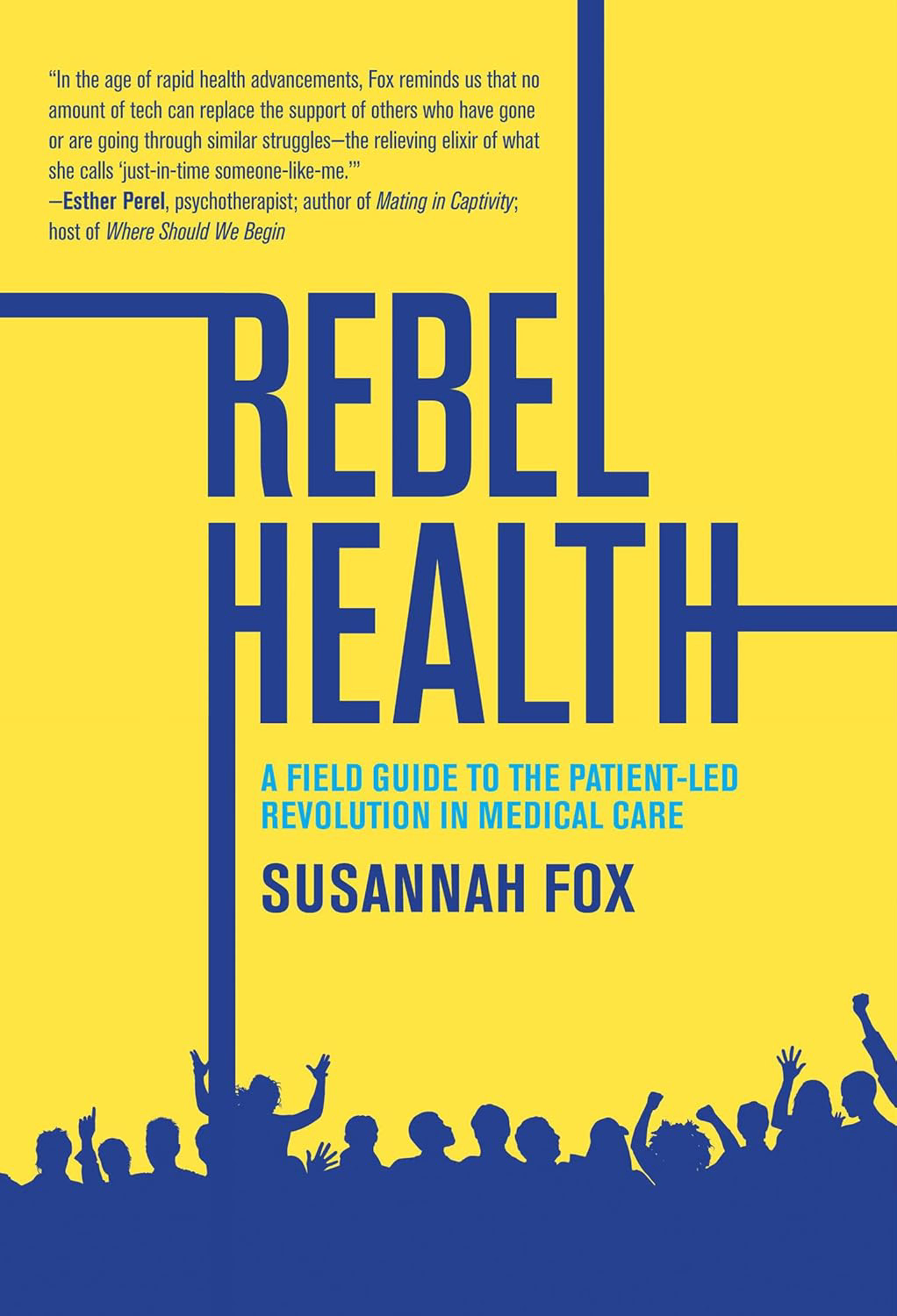
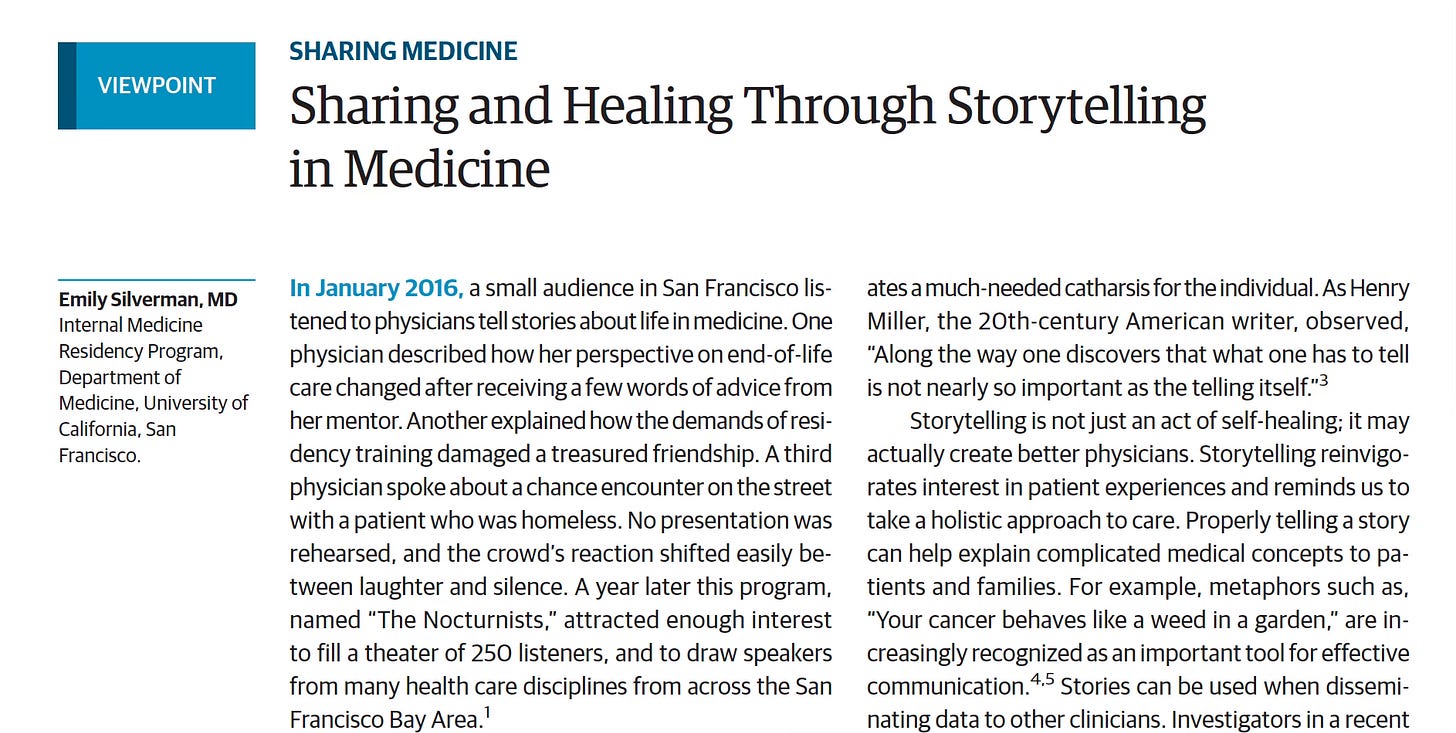
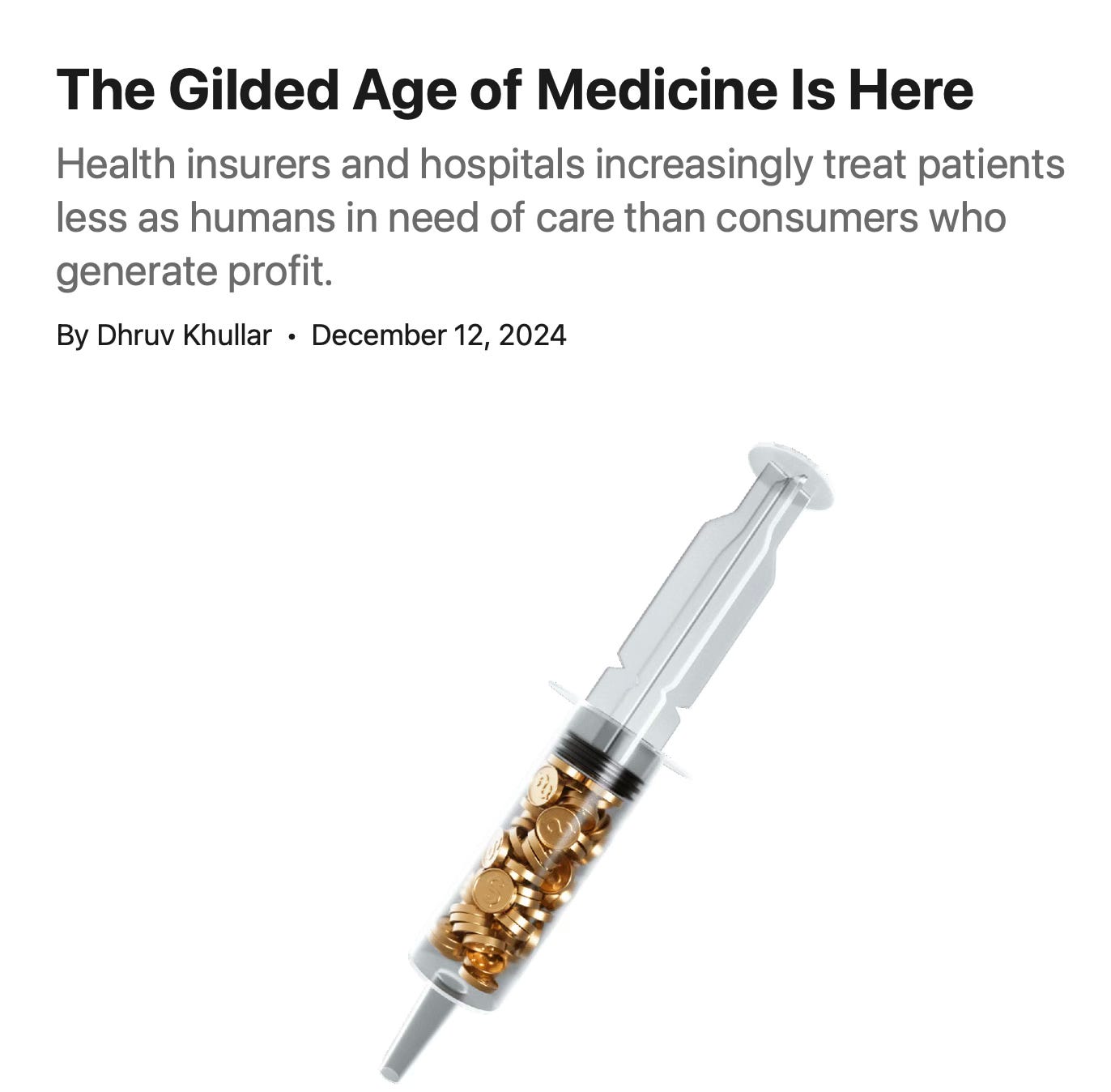
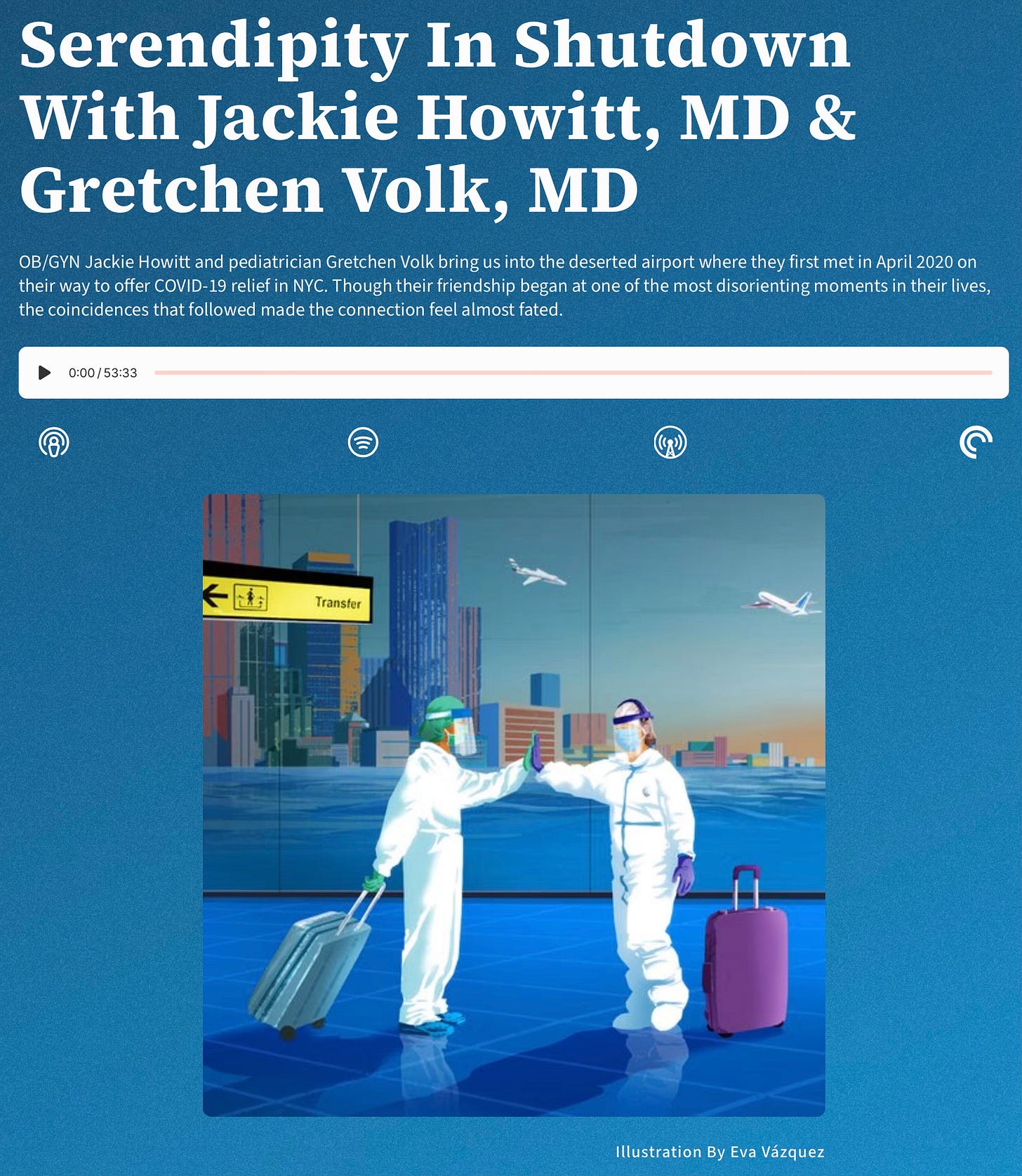
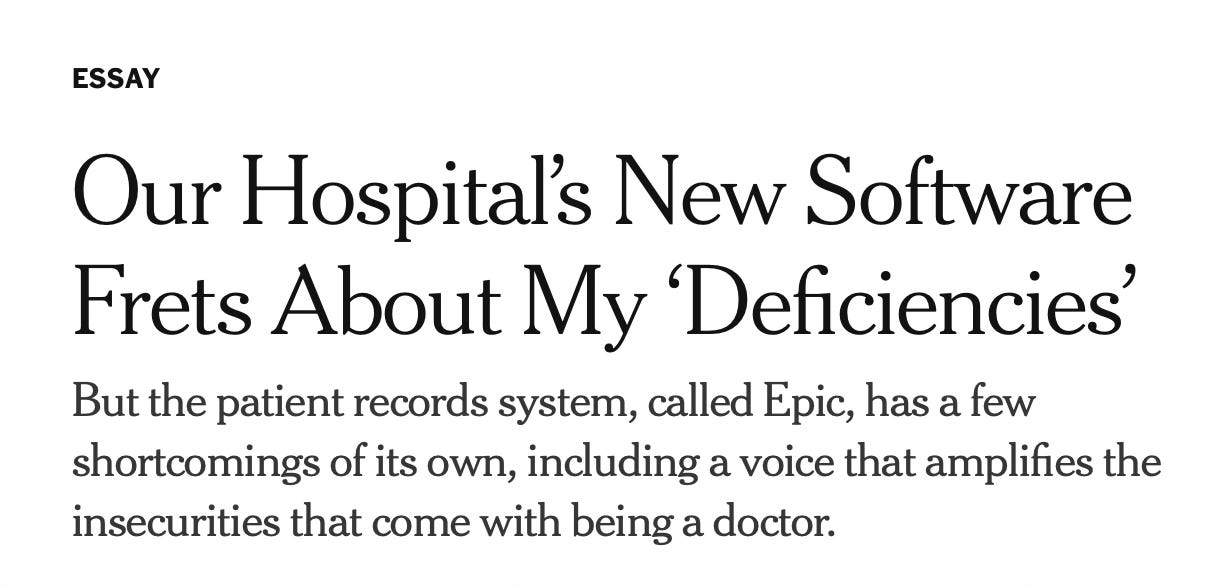







Share this post